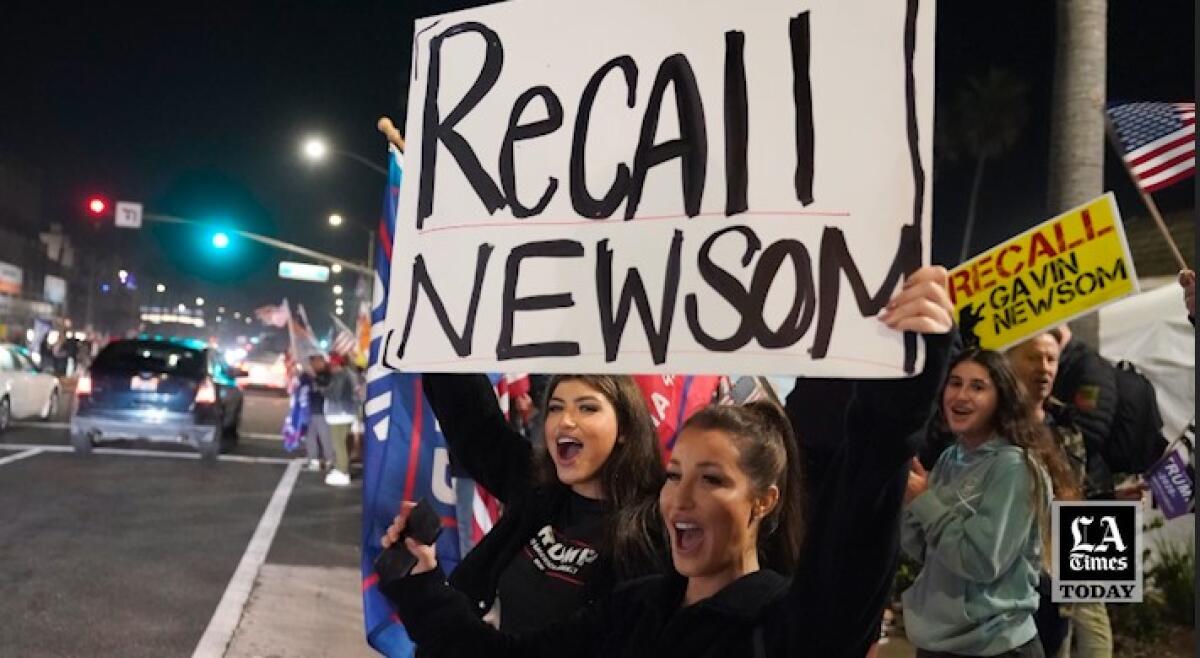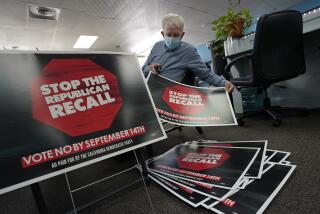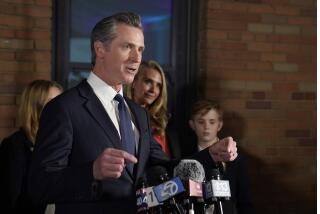California recall election cost $200 million, top elections official says

- Share via
SACRAMENTO — The unsuccessful special election to remove Gov. Gavin Newsom from office cost state and local governments more than $200 million, according to a final tally released Thursday by state elections officials.
The total cost of the statewide Sept. 14 recall election — in which voters overwhelmingly rejected the effort to oust Newsom — was a little more than $200.2 million, according to a letter sent to state and legislative officials by Secretary of State Shirley Weber, who noted that expenses were slightly below original expectations.
“This was a substantial cost to taxpayers and a significant disruption to governing the state,” Weber, a Democrat who opposed the recall, said in a statement. “This price tag confirms that it is necessary to revisit the recall process and to pursue effective reforms.”
Almost 87 cents of every dollar used to conduct the gubernatorial recall election was spent by election departments in California’s 58 counties, according to the letter Weber sent to the California Department of Finance and the chairs of the state Senate and Assembly budget committees. Counties are responsible for most of the elections operations in the state, including printing and mailing ballots and the costs of staffing in-person voting locations.
Newsom’s strong showing in the recall — only the second ever held against a sitting California governor — has reinforced a narrative in state political circles that the Democrat will face few, if any, high-profile challenges in his bid this year to win a second four-year term.
The candidate who won the most votes among the replacement candidates, Republican talk-show host Larry Elder, has already announced he will not seek a rematch against Newsom. Elder’s vote total paled in comparison with the number of voters who skipped the replacement candidate race altogether, following the advice of Newsom and other Democrats to simply vote “no” on the ballot’s recall question.
Last year’s state budget set aside up to $215 million to cover the costs of the recall election. But preliminary projected costs were $243 million, and some county elections officials warned the election would be even more expensive than that. In the end, all of those projections were too high. Some of the unspent money could be used to offset costs for the statewide primary on June 7 or the general election on Nov. 8.
Sixteen counties spent more than their allocation for the recall, according to the report released Thursday. Orange County reported $780,550 in excess costs, and Riverside County reported going over its recall budget by more than $2.9 million.
The costs generally were higher among the most populous counties. Los Angeles County reported spending almost $53 million to conduct the Newsom recall — an average of more than $20 per ballot cast. Statewide, the per-ballot cost was about $15.53.
Election worker costs made up the largest share of the recall’s expenses, according to the final report, totaling more than $81 million. Elections officials spent another $53.5 million mailing a ballot to each of California’s 22 million registered voters.
State elections officials spent the largest share of their money — more than $15 million — on voter awareness efforts and operations in Weber’s office of cybersecurity.
Mike Netter, a proponent of the recall, rejected criticisms of the cost by noting that the California Constitution has had a provision in place since 1911 allowing for the recall of an elected official.
“We didn’t create the recall rules,” Netter said. “We simply followed what was put in place.”
He also noted that taxpayers have footed the bill for numerous special elections to fill vacancies in the Legislature.
“Nobody ever looks at the cumulative cost of those,” Netter said.
The months following the recall have seen robust debate about overhauling the rules of special elections. Legislators have met three times to consider possible changes, including eliminating the replacement election for governor and having the lieutenant governor serve either the remainder of the term or until the next scheduled election.
More to Read
Sign up for Essential California
The most important California stories and recommendations in your inbox every morning.
You may occasionally receive promotional content from the Los Angeles Times.














